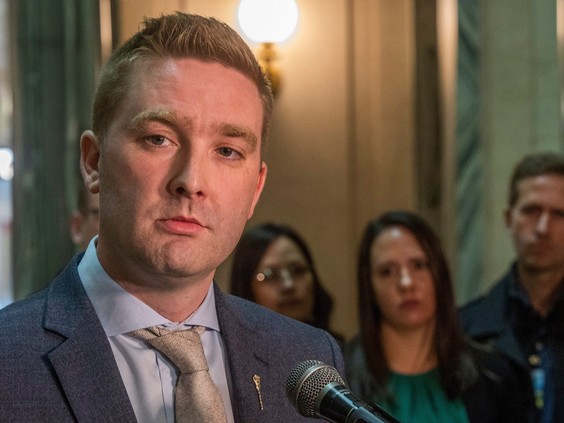
Binding arbitration would involve a submission of the dispute to a neutral party that would then provide recommendations to reach a solution.
Angela Amato, Regina Leader-Post
While collective bargaining negotiations remain at an impasse, the NDP Opposition and Saskatchewan Teachers’ Federation (STF) are calling on the province to agree to binding arbitration to get the conversation back on track.
“This is a process that can move negotiations forward,” said STF president Samantha Becotte at the legislature after question period Thursday. “Both sides would have the opportunity to present their arguments and put forward proposals that would hopefully get to a solution.”
Binding arbitration would involve a submission of the dispute to a neutral party that would provide recommendations to the province and the union.
“At the end of it, the arbitrator, through a fair judicial process would award a decision on what would then go into the agreement,” said Becotte.
Prior to 2017 amendments to the Education Act, 1995, only one party had to request binding arbitration. Today, both parties must agree.
The STF has been digging in its heels to get language and funding to address classroom size and complexity included in a new collective bargaining agreement (CBA), but the province has yet to budge.
Following question period Thursday, Education Minister Jeremy Cockrill said classroom size and complexity does not belong in a CBA, reiterating the government’s stance that it would prevent school divisions from making decisions based on their community’s needs.
“I think school boards understand their school communities best,” said Cockrill. “I think school divisions want to find ways to support students and teachers, but they need to have the autonomy to do that in their local school communities.”
Cockrill added the province has made a commitment to provide funding through a recently announced multi-year funding agreement (MFA) made with the Saskatchewan School Boards Association (SSBA).
Becotte said the union doesn’t want to take those decisions away from school boards, but wants to make sure they are held accountable for allocating funding to address needs related to classroom size and complexity.
“Teachers are the ones working day in and day out to try and support the students. They’re the ones who understand the needs of the students in their classrooms and they should be consulted in that process,” said Becotte. “If school divisions make the decision to increase superintendents, that’s not going to be in the best interest of kids … Not when we know that classes are increasing in size.”
Cockrill highlighted the commitment outlined in the MFA of $356.6 million over the next four years for classroom supports, plus another $4.9 million for pilot programs, but says the province won’t agree to binding arbitration because they’ve “only bargained for half an hour in five months.”
The actual amount of time both parties have sat across from each other at the bargaining table is different depending on which side is asked, but the STF has disputed the 30-minute claim.
“There’s an offer on the table from government addressing several other asks from STF leadership, be we haven’t had an adequate opportunity to discuss those,” said Cockrill. “I don’t think we’re at a point where binding arbitration would be appropriate.”
If the province continues to neglect issues of classroom size and complexity in the CBA and refuses to put it to binding arbitration, Becotte warned job sanctions will continue.
“We know that Hoopla is coming up next weekend, we know that there are many trips that are coming up after that. We don’t want kids to lose out on these opportunities,” she said.
If the province were to agree to binding arbitration, teachers will immediately suspend job action and negotiations would proceed, the STF said in a news release issued Thursday morning. The union says it’s important for the province to agree before March 17 so important extracurriculars won’t be impacted further.
“If the government agrees, negotiations will continue for all other items,” said the statement. “A tentative agreement could be brought forward to STF members for a vote while awaiting the arbitrator’s decision on class size and complexity.”
The NDP repeated its calls for binding arbitration Thursday, which included jabs at the government for being “out of touch.”
“Why won’t that minister get out of the way and send this issue to arbitration so there can finally be a resolution?” said education critic Matt Love during question period.
AnAmato@Postmedia.com

